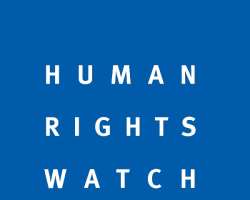Central African Republic: Peacekeepers Tied to Abuse
At Least 11 People Missing After Detained by Congolese Troops

GENEVA, Switzerland, June 2, 2014/African Press Organization (APO)/ -- African Union peacekeepers from the Republic of Congo (Brazzaville) have been implicated in the enforced disappearance on March 24, 2014, of at least 11 people in the Central African Republic, Human Rights Watch said today.
Approximately 20 soldiers from the African Union peacekeeping force known as MISCA took the group of 11, including four women, from the home of a local militia leader in Boali, a town 80 kilometers north of the capital, Bangui, witnesses told Human Rights Watch.
The peacekeepers detained the men and women after the militia group known as the anti-balaka, who are predominantly Christian and animist rebel fighters, on March 24 killed one Congolese peacekeeper and wounded four others. Those detained have not been heard from since, although their families have inquired about their whereabouts at the MISCA base and local police stations.
'The African Union needs to say what happened to the group that was detained and taken by the Congolese peacekeepers,' said Peter Bouckaert, emergencies director at Human Rights Watch. 'The peacekeepers are there to protect the civilian population, not to abuse them.'
Human Rights Watch called for an independent and impartial international investigation into the incident and the immediate suspension from peacekeeping duties of the implicated troops.
Human Rights Watch conducted a detailed investigation into the incident and spoke with five witnesses. Many other local residents, including officials and activists, told Human Rights Watch that they were too afraid to investigate or even discuss the incident because the Congolese MISCA troops have been known for intimidation and violence. Confirming this hostile atmosphere, while Human Rights Watch was investigating the March incident on May 25, Congolese MISCA soldiers severely beat a local police officer at a checkpoint following a dispute, and broke a beer bottle over his head, injuring him.
Contacted by Human Rights Watch, MISCA's leadership announced that an investigation into the incident had been ordered and would be conducted by the human rights section of MISCA. Human Rights Watch is cooperating fully with the investigators.
The anti-balaka are largely Christian and animist fighters engaged in a battle against predominantly Muslim Seleka forces, which overthrew the previous government in a March 2013 military campaign. Both groups have committed massive human rights violations against the local population over the past year. African Union and French peacekeepers were deployed to help stabilize the volatile situation and protect civilians.
This is not the first incident of abuse by Congolese forces Human Rights Watch has investigated. Human Rights Watch has gathered evidence that, in December 2013, Congolese troops in the town of Bossangoa tortured to death two anti-balaka leaders following the brutal lynching of a Congolese MISCA soldier the same day.
An enforced disappearance occurs when someone is deprived of their liberty by state agents, followed by a refusal to acknowledge the deprivation of liberty or by concealment of the fate or whereabouts of the disappeared person. Under customary international law, there is an absolute prohibition on enforced disappearances, and they may be prosecuted as a crime by the International Criminal Court (ICC). Although a discrete crime in and of itself, the act of enforced disappearance also simultaneously violates multiple human rights protections, including the prohibition of torture and freedom from arbitrary arrest and detention.
'Enforced disappearances, torture, and extrajudicial killings of civilians are serious human rights crimes and make a mockery of MISCA's mandate,' Bouckaert said. 'The African Union needs to investigate and address these crimes immediately. At stake is nothing less than the reputation and legitimacy of the peacekeeping force in a country that desperately needs protection.'
